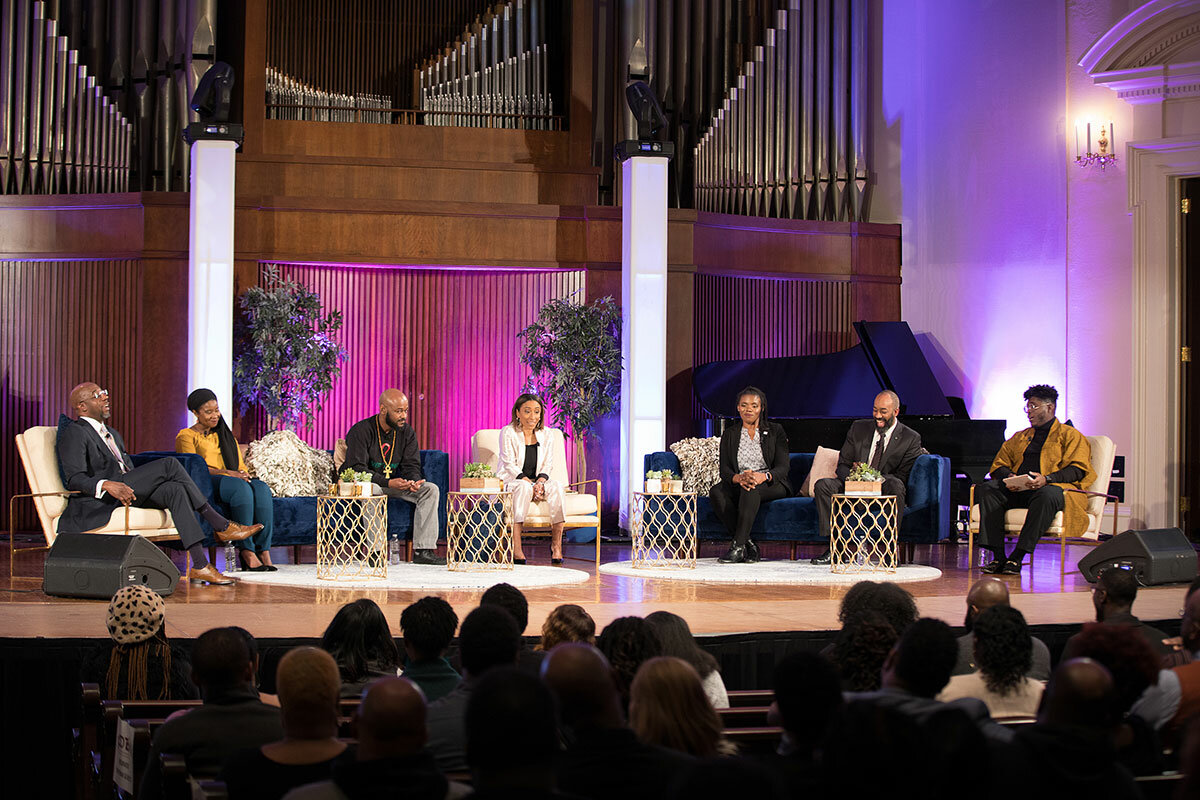For church-shy black millennials, music festival offers faith
Loading...
When singer and entrepreneur Pharrell Williams’ inaugural music festival kicks off this weekend in Virginia Beach, it will include a high-profile list of performers including Missy Elliott, Gwen Stefani, and Busta Rhymes. But it will also feature something else: spirituality.
From a talk with alternative medicine advocate and author Deepak Chopra to a pop-up church service, faith will be an important theme at Something in the Water, reflecting a yearning observers say exists among these concertgoers for ecclesiastical interactions regardless of the venue.
Black millennials in particular are seeking such opportunities, prompting more church time at music events – Kanye West led a service last Sunday at Coachella – and efforts to reach them from organizations such as the National Museum of African American History and Culture. The museum’s conversation series, gOD-Talk, will also be at Something in the Water, encouraging discussion about black millennials and their religious beliefs. This type of talk offers a chance for those involved to reclaim their narrative, says one leader.
Why We Wrote This
The decline in churchgoing in the U.S. is well known, but it doesn’t preclude religious talk in general. African American millennials are one group seeking outlets. How might venues like music festivals afford them a voice?
“Many times people are theorizing or pontificating about the habits of black millennials: We’re destroying things; we’re racked with debt. The beauty of gOD-Talk is that we are giving them agency,” says Teddy Reeves, the curatorial museum specialist of religion in the Center for the Study of African American Religious Life, part of the NMAAHC. “Our relationship with religion is complex and nuanced, and with this series we are working to chart our own territory.”
The Pew Research Center discovered that black millennials are more religious than other millennials, though fewer than 4 in 10 say they attend services weekly. Theologian, writer, and educator Candice Benbow has collaborated with gOD-Talk in the past and is appearing on its panel at Something in the Water. She says that the increase of unconventional religious black millennials is a direct result of the current sociopolitical climate.
“We are currently experiencing a movement moment, right? There’s Black Lives Matter, Me Too, Times Up. Millennials have walked away from organized religion because it’s been rooted in a lot of pain and trauma,” says Ms. Benbow, who hosts her own podcast, Red Lip Theology.
“How do I make sense of faith when people who are at the helm of religious leadership are being exposed? How do I contend with religious ideologies when we keep getting shot down in the street and the police who are killing us continue to be acquitted? These aren’t just cultural questions; they’re existential as well,” she says.
Part of the mission of gOD-Talk is to reveal how millennials, specifically black millennials, are interacting with religion. The project, which overall studies the “totality of the African American religious experience,” according to Mr. Reeves, is spearheaded by his center in association with Pew. It has participated in events at churches, museums, and colleges across the country.
“If black millennials are leaving traditional religious spaces, whether they are Christian or Muslim or Jewish or Buddhist, then where are they going?” Mr. Reeves says. “Pew’s data shows that there is a rise in the unaffiliated group, yet many still believe in God. There has also been a rise in young people claiming to be spiritual and not religious. We wanted to figure out what was going on, how this impacts our religious institutions going forward, and what this means for future generations.”
Unlike Mr. West’s Sunday service on the final day of Coachella, which was open only to festival ticket holders, the pop-up at Something in the Water will be free and open to the public. It will also consist of more than just a gospel choir; there will be a dance ministry, prayer offerings, and national worship leaders sharing the word. Mr. Williams’ uncle and the leader of Faith World Ministries, Bishop Ezekiel Williams, who will be participating in the service, told Norfolk’s ABC affiliate 13 News Now earlier this month why his nephew decided to engage in such an undertaking.
“At the root of Pharrell, he’s a secular artist. Of course, we know, but at his very core, he’s a very very spiritual individual. He’s very serious about God,” said Bishop Williams. “He remembered as a young boy pop-up church tent revivals and things like that that you would pass, and they seemed so energetic and spirit-filled.”
Using the festival as a backdrop for a service is a strategic move. “Some people are apprehensive, and they won’t cross the door, the threshold,” Bishop Williams continued. “They won’t come into the worship service, and so we tried to bring the service to them.”
Something in the Water aims to engage young religious folk where they are comfortable and feel free to be themselves. Ms. Benbow maintains that this is a step in the right direction. “As black millennials have gotten older, we’ve gotten more comfortable with the ability to say ‘My faith looks different than my mom’s faith or my dad’s faith, and I am still spiritual.’ That’s completely different than what we were raised to think was possible.”






